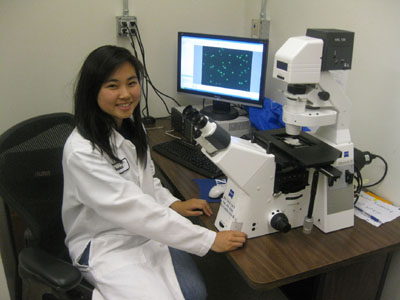Susan Chen Sciences
Exploring the Mechanism of Protein Scaffolding Toward Improved Metabolic Flux
Metabolic engineering has the potential to provide environmentally friendly routes for the synthesis of a variety of molecules, including therapeutics and biofuels. One way to improve the flux of metabolic pathways is the use of synthetic protein scaffolds that colocalize enzymes in the engineered mevalonate biosynthesis pathway. Susan’s project tests the hypothesis that optimal scaffolds of certain architectures mimic substrate channeling and function by forming large, oligomeric complexes that bring scaffolds into close proximity. Adaptor molecules are synthesized that co-assemble scaffolds to designably control complex size. Mevalonate product titers will be measured using GCMS, and protein colocalization will be verified by fluorescence imaging. The successful engineering of this adaptor strategy can be applied to other pathways due to its modularity.
